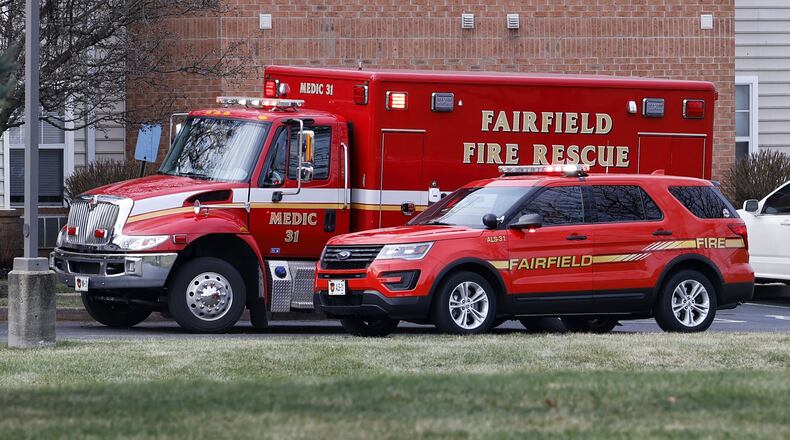“We are at a critical point with the fire department that we can no longer sustain the required level of service under this staffing model, using career and part-time personnel,” he said.
Fairfield’s continuing fire levy is on the May 3 primary ballot, which is anticipated to be a low-turnout election. Butler County Board of Election officials projects May to have a 19% voter turnout. Early voting in the spring primary began Tuesday.
Though failure of the levy could result in a dire situation for the department, passage would provide the department with the funding to appropriately staff the department. Without the levy, the fire department would receive supplemental funding from the city’s general fund, and projections show the city would deplete the required rainy day fund by 2029 and put the city’s Aa1 bond rating (the second-best possible rating) at risk.
Fairfield Finance Director Jake Burton said supplementing the fire department would also reduce funding for other high-priority items, such as the police department, capital projects, street improvements, and economic development.
The Fairfield Fire Department is what’s called a combination department, where they use part-time and full-time firefighters to provide fire protection and emergency medical service to the city of nearly 45,000 people. Over the past decade, firefighting staffing has become a national issue where not only are fewer people are choosing it as a career, but departments have struggling to hire and retain part-time people.
There are too many full-time job openings, Bennett said.
Fairfield is planning is to become a career fire department, where there are no part-time positions. They plan to convert the 36 part-time spots into 18 full-time positions over time. For each full-time position created, two part-time positions will be eliminated. If the levy passes, the plan is to add up to six of those full-time positions this year. Three full-time positions would be added annually between 2023 and 2026.
The city has 39 full-time firefighters and is authorized 36 part-time staff, though eight are vacant and Bennett said they have zero applications to fill those openings.
While Fairfield is asking for a new fire levy, they are also asking voters to eliminate the current fire levies.
Fairfield property owners pay a collective 7.15 mills on two continuing fire levies ― one approved in 2000 and one approved in 2016. If approved, those levies would go away and the 9.25-mill levy would be installed. The owner of a $150,000 home pays $485.63 a year, which is $195.63 more than what they now pay.
The fire department, like others, used to have no problems attracting part-time firefighters.
In the mid-1980s, Fairfield was one of the first fire departments in the region to incorporate a combination fire department model. This allowed the department to build a bench of firefighters who would develop knowledge, expertise, and the skill set necessary to maintain service. They’d stay for several years, including some who’ve stayed for decades.
However, as early as 10 years ago, Fairfield saw part-time personnel stay anywhere from two-and-a-half to three years. Today, Bennett said, they’re lucky to have part-timers stay for a year. The average time they stay is 10 months, and since 2015, nearly 150 part-time firefighters left either for a full-time job or the field altogether.
Because of the inability to retain part-timers, on-duty staffing has also changed.
In 1999, the city fire department had 2,814 fire and EMS runs with an on-duty staff of 19. For several years, the city had just 12 personnel on duty until a few years ago when it was bumped back up to 17, not including a shift supervisor.
In 2020, the department had 5,988 runs with 17 on-duty staff. Bennett said they can no longer maintain the 17 on-duty staff because that depends on a dwindling part-time staff. To maintain that 17 on-duty model, the department has relied on mandatory overtime among the full-time personnel, and “there are not the numbers to do that.” He previously told City Council he “cannot work (full-time staff) to the point of fatigue.”
Fairfield spent $1.4 million on overtime costs, which he compares to an “interest-only loan. We’re spending all this money and building no equity.”
“We’re squeaking by,” Bennett said.
About the Author

